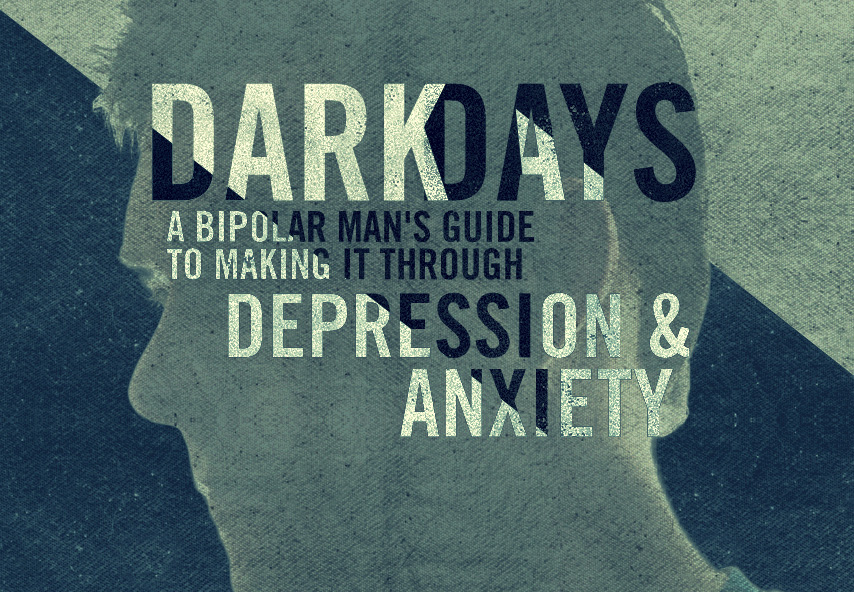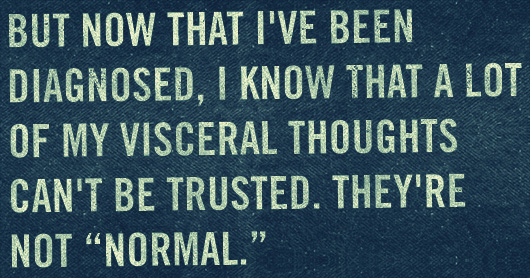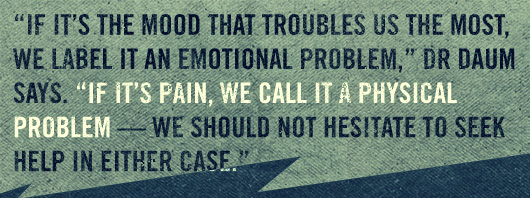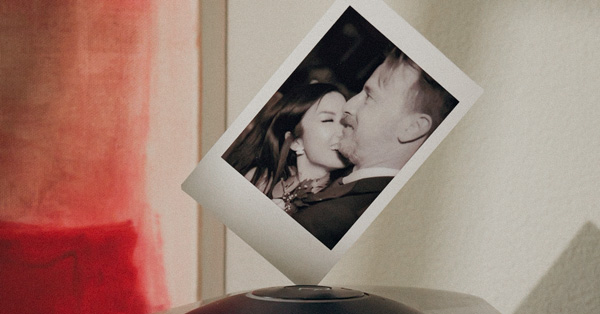When you come down, it feels like someone's drawn thick, black velvet curtains across your entire view of life. It feels fake. It's dreamlike and inescapable. And nothing can reverse the effect.
Depression is devastating. It’s isolating, it’s lonely, and eviscerates any shred of happiness.
It isn't a melodramatic state of mind—it’s actually as though someone replaced your eyes and mind to both see and process everything as a direct attack on everything you've held dear. The rain comes because you don't deserve the sun. You feel tired and exhausted because why do you deserve to be otherwise?
Depression consumes you both physically and mentally. It pushes you to the point that, sometimes, nothing feels worth it. Why should I breathe when there are so many more beautiful, loving, and deserving creatures out there that could use the oxygen?
And anxiety is the same way. It's strange to experience them simultaneously. You feel giddy—clammy palms and tapping feet—expecting something that probably won't even happen. Or you're excited about something that, to you, is life changing, but to anyone else, is most likely just another day.
Let's go back to February 2013.
I was sitting in a chair in a psychologist’s office in a suburb about 30 minutes north of Cincinnati, Ohio. It was early morning, and I should have been at work. But I was manic—and truth be told, being manic and actually knowing you are is almost as bad as being depressive.
We went through what I assumed to be a standard talk:
“I think I'm bipolar.”
“Do you experience highs and lows?”
“Yes.”
“When was your last low?”
“About four weeks ago.”
“What have you been doing to help?”
“Self-medicating.”
“Has it been working?”
“To a certain degree.”
“Can you explain more of the symptoms to me?”
“I feel like an insomniac sometimes. There are long stretches of time when all I do is stay up, toss and turn, drink and spend myself into trouble.”
“Oh, that certainly sounds like a manic state.”
“Yes.”
And so on.
I got a prescription of generic Depakote—which is actually used to treat epileptic seizures—and left. The truth is, I've been living with this problem for more than a decade now. And it's gotten to the point that I've grown to accept it. Sometimes I want to snap and scream, thrash and hurt. Other times, I want to become nothing.
But now that I've been diagnosed, I know that a lot of my visceral thoughts can't be trusted. They're not “normal.” They're not reactions people without this problem have, and I can't take it out on anyone.
And that brings us to lesson one in hopefully overcoming the problems that plague me—and possibly you, too.
1. Never Be Ashamed of How You Feel
It's not your fault. It's never been your fault. It will it ever be your fault.
Feeling the way you do just happens. Unless you're forcing yourself to feel things (which might make you something far more interesting than depressed), never disregard your own feelings. You may need to take a step back and truly assess why you are feeling the way you do, but never disrespect or devalue yourself because of how you feel.
Ever.
This took a long time for me to understand and accept. Depression and anxiety are problems—real problems like having a broken bone—that keep you from experiencing life as “normal” people should. And that's a hell of a lot more excruciating than a broken finger.
“We falsely distinguish between emotional and physical illness,” says Dr. James Daum, a psychologist who works with law enforcement and first responders in my hometown Cincinnati. “All illnesses are experienced both physically and emotionally.”
Daum’s spent the better part of 30 years helping people with high-stress jobs, as he says, “retire successfully.”
None of us are invincible. No matter how hard you train your mind and body, we’re all liable to receive some injurious moment that erodes our confidence.
2. Open Up (To Those Whom You Need To)
The day I was diagnosed, I went back to work and talked to my boss. Now, during this time, my boss was an incredible man with an unparalleled gift to relate to anyone. I trusted him like I trust any of my close friends (which is a case of lucking out, I know), and told him what happened.
I told him that some days even the smallest things were enough to obliterate any chance of happiness in my life. I told him that I struggled with alcohol and, at times, wanted to never wake up again. That my days were either dominated by feelings of invincibility or asphyxiating pressure.
He understood.
And that's just the thing: Most people have hit that point—a moment in life when even waking up is a monumental struggle.
The lesson here is that the people close to you have known at least some varying degree of what you're experiencing. Whether your heart races every time you even think about social interaction or if your days have an immovable pall draped over them—people know. And if you're close enough to someone that you feel comfortable bringing your problem up to, you will be surprised.
Darkness and terror touch us all—either with a gentle fingertip or a full-bodied embrace. When you feel yourself being brought down into the depths, however, you need to stop.
Just stop. Stop your Goddamn life and your feelings and get away from everything. Stop thinking—listen to a song you love, do anything you need to do to give yourself a chance to think.
You're not who you are normally—you're trying to run with a broken leg. You're succumbing to your anxiety or depression. And you're stronger than that—you're better than that. You're stronger than that chemical imbalance.
Breathe.
Blink.
Think.
Get a hold of your mind and get out of any situation that makes you feel like you're losing it. Find comfort and then assess your situation.
3. Get Help
Go see a professional. Get diagnosed. Just know for sure.
Whether you get put on Depakote or some other medication, you'll know. You'll know that those extremes in your head—sparkling, beautiful moments and those nights you spend just wondering—are OK.
It is OK, guys. It's OK to feel the way you do and there's nothing wrong with the way you feel. There's nothing wrong with having a problem, and the sooner you understand and accept that, the sooner you can feel better. You may not be cured, but you can feel better.
“If it’s the mood that troubles us the most, we label it an emotional problem,” Daum says. “If it’s pain, we call it a physical problem — we should not hesitate to seek help in either case.”
Help came to me a little late, but it did come nonetheless. And with help, came understanding and this clarifying realization that I’m going to have to live with bipolar disorder and anxiety most people will never understand.
Dr. Daum’s been helping people for years. It’d be wise to take his words seriously.
4. Symptoms to Watch For
Unless you get forced into seeing a doctor, no one knows that something is wrong but you. Maybe you’ve garnered and embraced a persona of being silent and severe. Or maybe you’re known for being a shut-in and are OK with it. It doesn’t have to be that way, though.
If you have either of these two afflictions, you’re not living your life to its entire capacity. Don’t let that be the case. If you’ve been feeling “off” as of late and can’t quite identify what it is that’s making you feel that way, take a few minutes to assess your condition and read through Dr. Daum’s two lists of symptoms:
Anxiety
- A feeling of uneasiness and uncertainty
- Excessive worry, extending into problems that are not that significant
- Muscle tension, increase in headaches, stomach distress, tightness in the chest
- Trouble concentrating, forgetting things, general disorganized
- Awake at night worrying, not sleeping well
Depression
- Lack of energy and motivation
- Sleeping more or less than usual, feeling tired when you wake up
- Not wanting to be around people
- Loss of interest in activities that are normally enjoyable
- Feeling hopeless and helpless
- Negative thoughts about yourself, others, and your life in general
- Loss of appetite
Don’t hesitate to seek help if these two lists seemingly describe you.
5. Recover—Or Something Like It
It’s not really possible to truly “get better” from mental illnesses like these. It isn’t like a broken bone in that sense. But you can foster an understanding. The sooner you admit to yourself that you might be suffering from something like depression or anxiety, the sooner you’ll start to feel normal again.
It goes beyond declaring to everyone around you that you have some sort of mental illness. Hell, this is the first time I’ve actually publicly discussed being bipolar. And you know what? I don’t care anymore because it’s as much a part of my life as anything.
It’s you that has to admit it. It’s a battle on the most personal level, and it’s something only you can overcome. Because who else knows you better than yourself?
Be strong, my friends. We as humans have been gifted these magnificent minds with their tiny sparks of imagination — and all the horrible, illogical, unforgivable thoughts that come with them.
If you or anyone you know are suicidal, please seek help immediately. If you just need someone to talk to or would like to contact Gin, reach him via email at Ando.gin.a[a]gmail.com or through twitter @GinAAndo.

















![It’s Time to Begin Again: 3 Uncomfortable Frameworks That Will Make Your New Year More Meaningful [Audio Essay + Article]](https://www.primermagazine.com/wp-content/uploads/2025/01/begin_again_feature.jpg)
